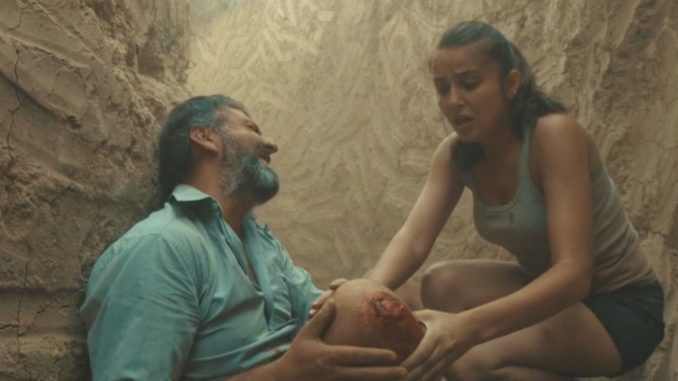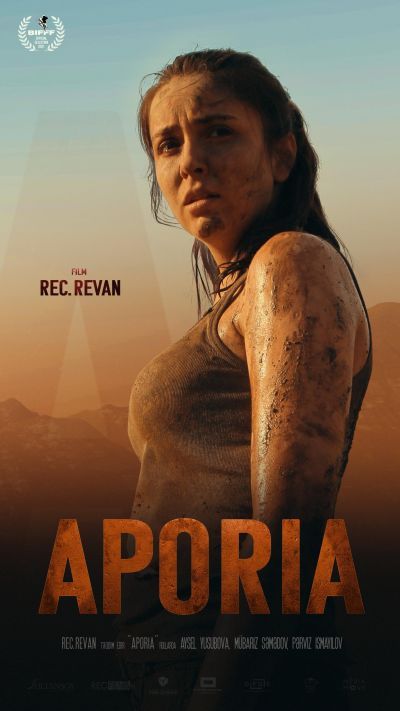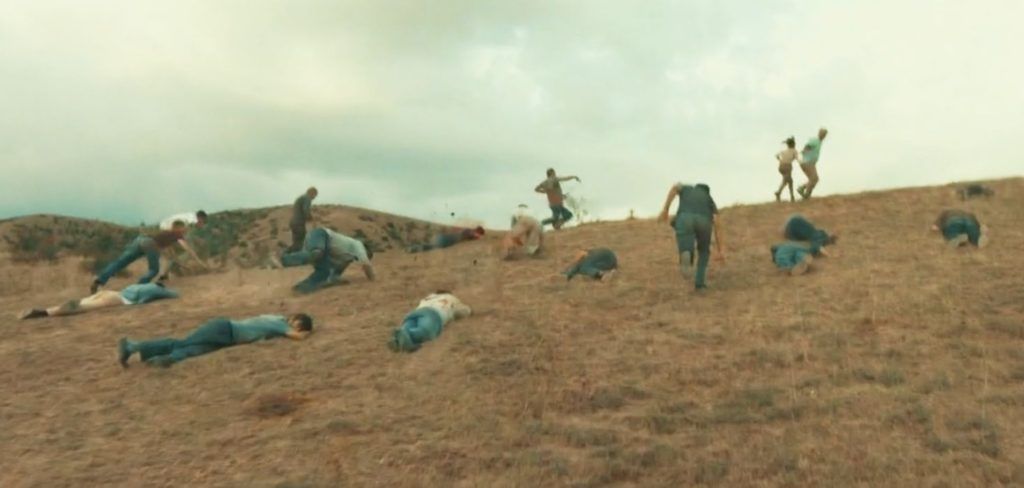
Rating: C+
Dir: Rec Revan
Star: Aysel Yusubova, Perviz Ismayilov, Mubariz Samadov, Rahim Gojayev
This is not to be confused with the 2023 film of the same name, a time travel movie starring Judy Greer. Adding to the potential for that, the IMDb synopsis for this one reads (emphasis added), “A crime, mystery, time travel story… which fits marvellously well and seems quite realistic despite the uncommon situations.” Wait, what? Because, having seen it, I am fairly sure there was no time travel present here at all. Even “crime” and “mystery” require holding the movie at an unusual angle, and squinting a bit. In any case, odd to have two films whose title is a word I didn’t know. Aporia means “a conundrum or state of puzzlement.”
Well, glad that’s cleared everything up. Moving on.
Azerbaijan is a former Soviet republic, which has been independent since 1991. Though like our earlier discussion of Belarus, the term “independent” is doing some heavy lifting. In reality, it just means a different set of dictators in charge, the Aliyev family having held the presidency for more than thirty years. Films made there date all the way back to 1898, when catchily titled movie, The Oil Gush Fire in Bibiheybat was shot by Alexander Mishon. It’s forty-eight seconds long, and is untroubled by plot and characterization, consisting entirely of giant fireballs. So Mishon should be considered an early influence on Michael Bay’s filmography. I’m not going to lie though: I’ve seen worse this week, and it’s only Tuesday. In terms of getting to the point – giant fireballs – it deserves five stars.
 Unlike many of the countries we have covered this month, Azerbaijan has experienced success at the Academy Awards, albeit by proxy. In 1992, the first year after the break-up of the Soviet Union, the Academy Award for Best Foreign Film went to Burnt by the Sun from Azerbaijani director Rustam Ibrahimbeyov. However, it was submitted as the Russian entry: his home country didn’t get their act together for their own Oscar entry until fifteen years later. They’re still waiting for their first nomination. Mind you, film hasn’t been a priority. In 1997, its national studio, AzerFilm, was shut down after electric and heating bill went unpaid for five years. The last point for which there’s data, 2011, says the entire country with its population of 9.1 million, had only seventeen cinema screens.
Unlike many of the countries we have covered this month, Azerbaijan has experienced success at the Academy Awards, albeit by proxy. In 1992, the first year after the break-up of the Soviet Union, the Academy Award for Best Foreign Film went to Burnt by the Sun from Azerbaijani director Rustam Ibrahimbeyov. However, it was submitted as the Russian entry: his home country didn’t get their act together for their own Oscar entry until fifteen years later. They’re still waiting for their first nomination. Mind you, film hasn’t been a priority. In 1997, its national studio, AzerFilm, was shut down after electric and heating bill went unpaid for five years. The last point for which there’s data, 2011, says the entire country with its population of 9.1 million, had only seventeen cinema screens.
It’s therefore no surprise that horror films have been almost non-existent. The IMDb lists just five. Two are outside our time-frame of the last decade. One has only a trailer, and doesn’t appear to have been released yet. Khennas has a scathing IMDb review: “It was so funny. It wasn’t trying to be funny, but it was very funny.” That leaves just Aporia: I did not so much pick this one, as it was the only candidate left. It is on Tubi, but only in a terribly dubbed version, so I went through the usual sources to get a subbed copy instead, and it will be the one reviewed here. But I will include the Tubi synopsis: “Two human guinea pigs rounded up in a massive zombie experiment escape their captors’ execution and are left to fight for their lives in hiding.”
For this could either be regarded as a bit of a spoiler or helpful information, because it tells you things to which the film generally alludes, rather than making apparent. We join things in the back of a truck going along a remote rural road, where a group of people are being taken somewhere indeterminate, by unidentified captors, for reasons that are uncertain, yet quickly are shown to be unpleasant. One of the men, Arvin (Ismayilov), wants to stage an escape bid, and when the truck stops, tries to put his plan into action. However, it’s doomed by a lack of support, and it then becomes clear they have been brought to an Azerbaijani version of the killing fields (bottom).
The captives scatter, seeking shelter anywhere they can. In the case of Arvin, Ejla (Yusubova) and another, this comes in the shape of tumbling to the bottom of a deep crevasse. While this does protect them from the bullets and crossbow bolts, a different problem arises: they’re unable to climb out. When Arvin tries to jury-rig a solution with a branch and makeshift rope, he only succeeds in injuring his leg. That’s not all. You know I mentioned the “another”? He didn’t survive long, and is now a corpse, further along the trench. You know the synopsis mentioned “massive zombie experiment”? Yeah. I will leave the putting of two and two together as an exercise for the viewer.
 This is strongest at the beginning and end. The opening throws you right in to the action, and it’s not long before the bad situation is apparent [there’s an unexpected bit of FX to this end – you only see it in long-shot, but it still provoked an audible exclamation from Chris]. Similarly, the ending goes back and forth, flipping between hope and despair, before finally settling firmly on one side of the coin. Unfortunately, it struggles to retain this energy in the middle. It is basically Arvin and Ejla splashing around in a mud-pit for about an hour, although the zombie subplot adds a little bit to the mix.
This is strongest at the beginning and end. The opening throws you right in to the action, and it’s not long before the bad situation is apparent [there’s an unexpected bit of FX to this end – you only see it in long-shot, but it still provoked an audible exclamation from Chris]. Similarly, the ending goes back and forth, flipping between hope and despair, before finally settling firmly on one side of the coin. Unfortunately, it struggles to retain this energy in the middle. It is basically Arvin and Ejla splashing around in a mud-pit for about an hour, although the zombie subplot adds a little bit to the mix.
I would probably prefer to have seen some of the events leading up to the truck journey. The notion of “human guinea pigs” is an appalling one – see Man Behind the Sun – and would lend itself to horror, more so than the amputation-free version of 127 Hours that we forms the main course here. However, compared to the slew of slashers, found footage and ghost stories we’ve seen around the world elsewhere, Revan is to be commended for coming up with a largely novel idea. It may represent, for now, twenty percent of the entire output of Azerbaijan in our genre. However, it’s not a bad twenty percent. Despite the lack of giant fireballs, it’s an improvement on The Oil Gush Fire in Bibiheybat.
This review is part of our October 2024 feature, 31 More Countries of Horror.
